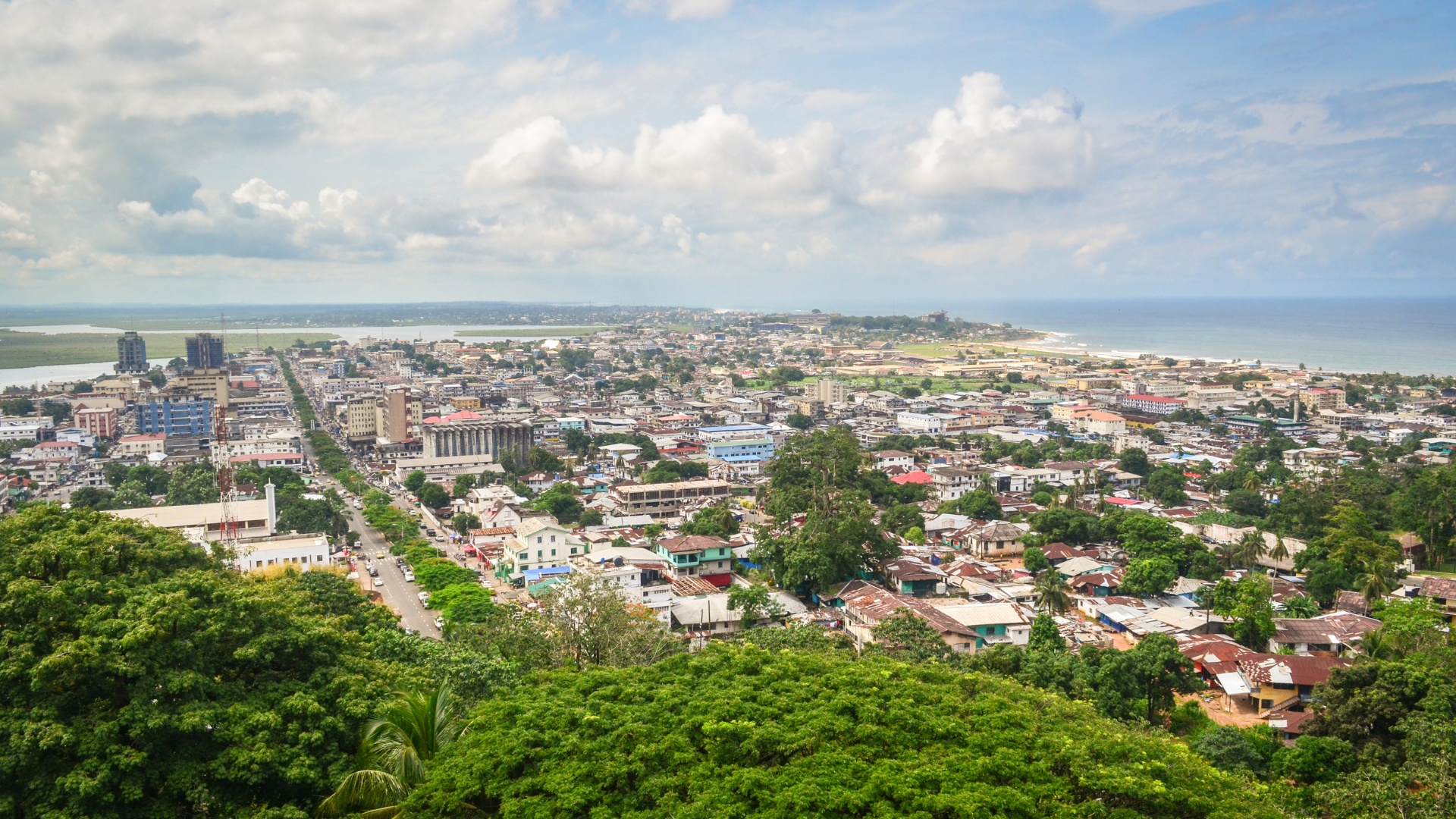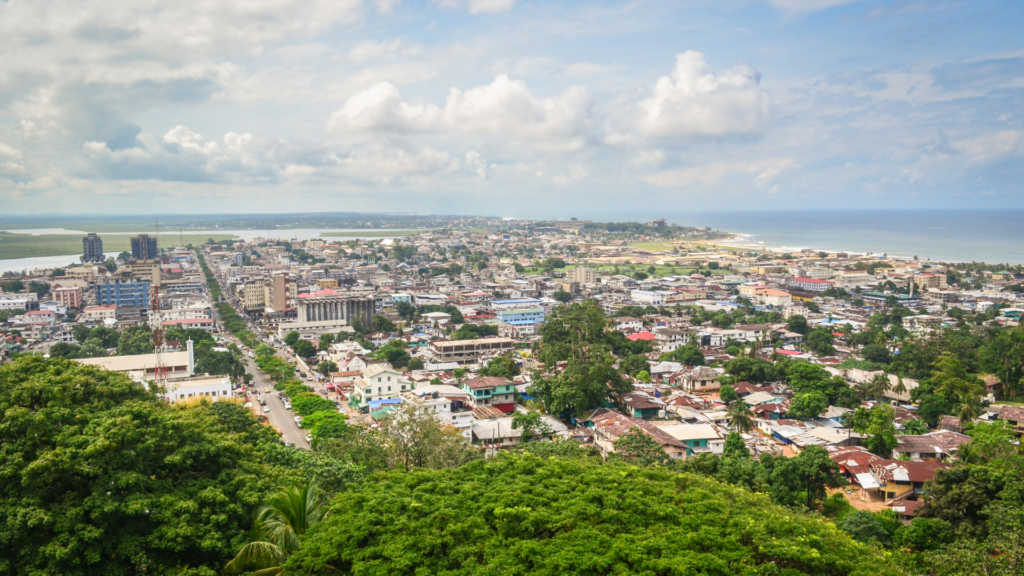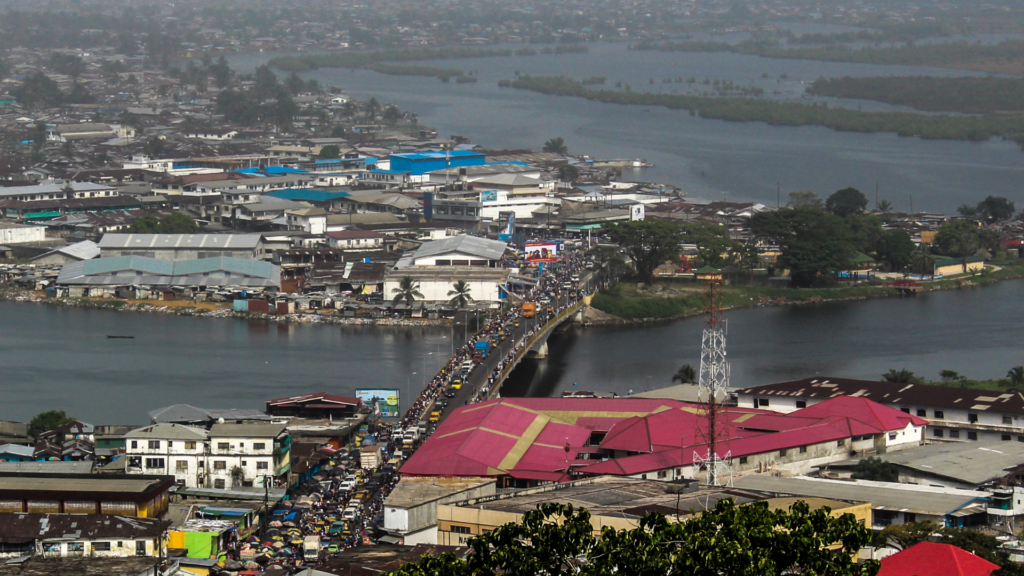24 August 2021
Feature City Profile: Monrovia
Tackling Monrovia’s climate challenges through community engagement



Monrovia is acutely aware of the current climate change challenges and the need to respond to threats. By adopting an inclusive approach, Mayor Jefferson Koijee has proven that implementing plans and strategies can be a collective effort that enables cities to embed resilience into the fabric of their city.
Lord Mayor Jefferson Koijee of Monrovia is a member of ICLEI’s Regional Executive Committee and has often noted that community engagement is key to tackling resilience and sustainability challenges in his city. During a Covenant of Mayors in Sub-Saharan Africa (CoM SSA) webinar in 2021, Mayor Koijee noted that “When you engage the people, you realise the solutions you are looking for could be with them”.
Monrovia is the capital of Liberia, which is Africa’s oldest republic – having declared independence in 1847 – and has a population of approximately 1.5 million (around one third of the country’s population). Its key sustainability and resilience challenges are waste management, the degradation of natural resources, biodiversity loss, as well as coastal management.
The effects of climate change are evident in the city. Over the last decade, coastal erosion has caused Monrovia’s shoreline at its West Point area to retreat around 30 metres, with just under 700 dwellings having already been lost. It has been estimated that an additional USD40-48 million in climate change related damages could occur in this area if not addressed. What is apparent, is the pressing need for an adaptive and resilient approach in tackling these challenges.

Coastal climate adaptation approaches
In order to assist in tackling such issues, the Cities Alliance Community Upgrading Fund (CUF) recently expanded its work to finance climate adaptation projects in two coastal areas in Monrovia – King Gray Town and West Point. These projects have the overarching aim of assisting informal coastal areas in building their resilience by increasing capacity to adapt to climate shocks.
Areas such as King Gray Town and West Point have large urban poor populations that often live in informal structures in precarious locations without access to basic services. This makes them extremely vulnerable to the impacts of climate change – especially incidents of flooding, mudslides and coastal sea-level rise. The CUF’s work with these communities – launched in September 2020 – therefore assists these at-risk communities to identify vulnerabilities and structure unique approaches that improve resilience. Throughout the process, the local communities are central in all aspects of the CUF’s planning, engagement and decision-making.
Being a coastal city, Monrovia is extremely vulnerable to intense storms, flooding, mudslides and sea-level rise – which put its poorest residents at high risk. Shoreline retreat and coastal erosion are already apparent, with these climate change-related impacts threatening Monrovia’s wetland ecosystems, livelihoods and overall progress towards their sustainability goals.
The Monrovia Metropolitan Climate Resilience Project is a Green Climate Fund project that improves coastal management and offers these vulnerable communities an opportunity to increase their resilience. It focuses on both current climate-change risks but also provides communities with opportunities to plan for further resilience shocks and secure their coastal future. By building institutional capacity, the project also strengthens gender- and climate-sensitive livelihoods to address local climate resilience.

Greening the city and urban improvement
In May 2019, the Monrovia City Corporation, in collaboration with the Society for the Conservation of Nature under the United Nations Development Programme (UNDP) Climate Change Mitigation and Community Adaptation project, piloted the planting of trees along the river banks in two communities – Vai Town and Slipway.
In August 2019, Mayor Koijee launched the “Your Tree, My Tree” project, which saw over 13 kilometres of coconut trees and flowering trees planted along significant boulevards and streets in the city.
Another initiative is the Monrovia Integrated Development Project, which is a World Bank- and French Development Agency-funded project that aims to support urban improvement in Monrovia and surrounding areas for sustainable development. The project seeks to support national and local government institutions, neighbourhoods and communities in addressing infrastructure, environmental and social vulnerabilities due to the impact of climate change and other causes.
Monrovia is also currently working with various United Nations agencies in order to strengthen Liberia’s efforts to entrench sustainable development principles in its national policies. The Sustainable Development Institute is one such organisation that is also involved here, as it works to transform decision-making processes regarding natural resource management.
Tackling waste management to build resilience
Another resilience challenge apparent in Monrovia is the issue of waste management. Infrastructure damage due to years of civil war and rapid urbanisation in the years that followed have increased the amount of waste generation. In September 2018, Mayor Koijee announced plans to develop a waste-to-energy programme for Monrovia City Corporation, in order to manage the city’s long-term waste challenges more sustainably. This programme also includes a plastic recycling component and is led by the Solid Waste Management Department – whose motto is “Clean, Green and Resilient”.
The Cheesemanburg Landfill Urban Sanitation (CLUS) project is a World Bank and Government of Liberia co-funded initiative aimed at improving access to solid waste collection and reduced disposal in Monrovia and surrounding areas. It was launched in June 2017 with the World Bank’s partners – the Liberia Reconstruction Trust Fund (LRTF) and the Project Implementation Unit (PIU) at Monrovia City Corporation – and, although it is designed as an urban development project with solid waste management as an entry point, it also assists with citizen engagement and awareness regarding these pertinent issues.
An innovative, low-cost initiative to tackle waste and turn it into cooking gas and fertiliser is the HomeBiogas project in the suburb of Paynesville. In November 2019, HomeBiogas – in partnership with Cities Alliance – implemented a waste-to-energy project using biodigester units. This project is funded by the European Union and reduces greenhouse gases and landfill emissions, whilst at the same time provides livelihood opportunities for people in vulnerable communities, as they are able to be employed in primary waste collection activities.
Ten biodigester units were installed in schools in Paynesville and the project also provided training to the school staff and students to ensure proper operation of the units. Some units work off the organic kitchen waste produced by the schools, while other systems are powered by the bio-toilet waste. Bacteria in the units convert the organic waste into biogas for cooking and also produce organic fertiliser as a by-product – which is used in the school’s vegetable gardens, where students sell the produce at local markets. By turning to biogas, these projects reduce greenhouse gas emissions, encourage sustainable waste management and prevent soil and water pollution.
In April 2019, Mayor Koijee and Liberia’s First Lady, Madam Clar Weah, launched the “Weah for Clean City Programme”. This is a primary waste collection initiative that requires all buildings to subscribe to a door-to-door waste collection service. Private waste collection companies, known as community-based enterprises (CBEs), and small and medium enterprises (SMEs), are assigned to neighbourhoods to collect waste. The Monrovia City Corporation is working with community leaders to recommence the programme in early November 2021, given that the programme was affected by the COVID-19 pandemic. As part of efforts in this direction, Cities Alliance – with funding from the European Union – is supporting a microfinance loan scheme to help capacitate CBEs and SMEs to provide adequate services.
Mayor Koijee is a staunch supporter of the value of larger knowledge sharing networks, such as CoM SSA and ICLEI Africa, noting that these city networks are platforms for “mutual support [and] an avenue for knowledge and change”. Given the unprecedented challenges all African cities are currently facing with the COVID-19 crisis, and the fact that city officials are often the first responders on a local level, Mayor Koijee is acutely aware of the importance of building resilience at city level in order to better respond to pandemics and ensure sustainable development.


